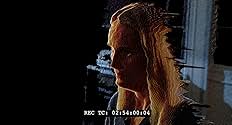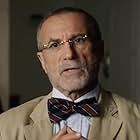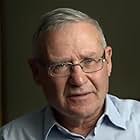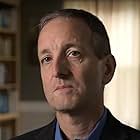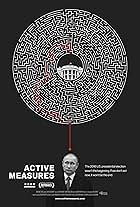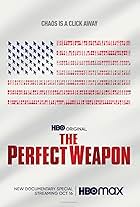Aggiungi una trama nella tua linguaA documentary focused on Stuxnet, a piece of self-replicating computer malware that the U.S. and Israel unleashed to destroy a key part of an Iranian nuclear facility, and which ultimately s... Leggi tuttoA documentary focused on Stuxnet, a piece of self-replicating computer malware that the U.S. and Israel unleashed to destroy a key part of an Iranian nuclear facility, and which ultimately spread beyond its intended target.A documentary focused on Stuxnet, a piece of self-replicating computer malware that the U.S. and Israel unleashed to destroy a key part of an Iranian nuclear facility, and which ultimately spread beyond its intended target.
- Regia
- Sceneggiatura
- Star
- Premi
- 1 vittoria e 8 candidature totali
- Self - Director of NSA 1999-2005, Director of CIA 2006-2009
- (as General Michael Hayden)
- Self - Commander of Israeli Defense Intelligence 2006-2010
- (as Major General Amos Yadin)
- Self - Staff Judge Advocate, U.S. Cyber Command, 2009-2012
- (as Colonel Gary D. Brown)
Recensioni in evidenza
As observed with previous movies about IT-related issues (WikiLeaks, Snowden, Steve Jobs etcetera) it is very difficult to sit it through while being (like myself) someone who worked in IT all his life. We saw numerous fragments of Assembler, flashing lights from network equipment, heavily populated cable bundles, and many screens showing various sorts of abracadabra, all supposedly intending to look technical for an average layman. Another problem is that several talking heads ducked when asked specific questions about Stuxnet, the latter being the main topic of this movie. Most of them had the usual excuse *Even when I knew about it, I cannot elaborate". Luckily, we heard not once the excuse "I can tell you about it but after that I have to shoot you", usually intended as a humorous escape from hot questions without appearing offensive or overly defiant. Several high ranking officials only wanted to speak out in general terms, thereby avoiding Stuxnet and other concrete projects, by explaining what they found wrong, especially about the secrecy that most found exaggerated and unnecessary. As such, their contributions were still useful, albeit not exactly touching the subject at hand.
Nevertheless, I heard a few new things I had not thought about yet. Firstly, Stuxnet was not designed to become so visible as it did. People at the NSA were furious when seeing that Israel extended v1.1 of the software to be more aggressive, making it spread and allowing it to surface, while that never had been the intention. The net result is that other countries may find justification to counter with similar software, now the US has provided for a precedent. Secondly, many people in CIA and NSA express their concerns about over-classification, preventing an open debate on future policies and rules of engagement in cyber space, like similar rules developed in the past for army, navy and air force. Cyber weapons are the fourth category, and it may take 20 to 30 years to create clear rules and policies for it. Lastly, the net effect that Stuxnet had on Iranian nuclear program, has proved to be negligible in the long run. There was a noticeable dip in the production statistics, but it triggered Iran to invest extra in centrifuges. An extra side effect was that Iran invested in cyber powers of their own, by attracting talented people on this field of expertise. As of now, it looks like they succeeded in overpowering the western world in this so-called cyber war. In other words, due to Stuxnet we lost our head start, and it is doubtful we will ever regain that.
There was one talking head with distorted voice and face, who appeared many times throughout the story. In hindsight, she was reading collected texts from several people working in NSA, CIA etcetera, all of them having useful insights on the matter but unable to come forward. Being reasonably versed in these issues, I am of the opinion that these texts sound genuine and seem to really come from people with intimate knowledge, which would otherwise be kept from the public. One example is that they internally made fun about "air gapped", the common defense against infections from the outside. They knew several ways to get over this obstacle, e.g. by infecting vendors responsible for installing and updating software in the plant, more or less working like so-called watering hole attacks. Reading these texts as done here, was an artificial but necessary addition to the documentary. In a final scene the one reading the texts revealed herself as an actress who had no personal involvement in the issues, but was effectively used as a vehicle to get this information across. During the press conference organized by the Berlinale it was explained that this was the only way to obtain and release this information, if only to protect the sources since harsh policies have been issued to deal with information leakage.
All in all, I'm not sure the message will land where it should land, namely with non-IT people who should know about the implications of "cyber warfare", having an impact on our future that cannot be underestimated. I don't think that a documentary that takes nearly 2 hours, will achieve said goal. Nevertheless, I applaud every honest attempt. The documentary is well made and tries to present a balanced view on the matter. Well made, but probably shooting over everyone's head and defeating its well-intended purposes.
The film starts after the fact and works backwards. In doing this it allows to do enter the subject via the security companies who found this virus and started trying to figure out what it does. This is done in a way that is engaging and accessible, even though you are talking about guys reading screen after screen of code. From here the film starts to draw in the politics, to explain Iran, and as it does this, the pieces fall into place – just as they did for the security guys. This framing helps make the film clear to follow, but also builds the tension in the film as we go from the unknown, to the understanding, and then are left with what it means for the road ahead.
The film's ending doesn't really do a good job of leaving us with that chill (I think the drawing in of the Iran deal didn't really work), but mostly it still does leave the viewer thinking about how much could go wrong if key infrastructure elements were switched off or controlled to do harm. Watching it a few days after the inauguration of Trump only makes it more chilling, since the only time I have heard him speak about this he said "So we have to get very, very tough on cyber and cyber warfare. It is — it is a huge problem. I have a son. He's 10 years old. He has computers. He is so good with these computers, it's unbelievable. The security aspect of cyber is very, very tough. And maybe it's hardly doable". Hardly oil on troubled waters.
"To make a documentary on such a complicated, far-reaching subject and maintain a common-sense perspective requires formidable organizational skills and a steady narrative hand to keep the movie from straying into any number of theoretical byways. It takes the imagination of a science- fiction writer to make it coherent and entertaining enough to hold your attention. Mr. Gibney has demonstrated all of these qualities..." Stephen Holden, The New York Times.
This two hour film describes how Stuxnet changed the world, first from the eyes of malware researchers and how they discovered the worm and how they started to analyze it and realize how advanced it is and what it does, then goes into the political realm, describing how the US and Israel did this to Iran, then narrows down, showing not only how this was something the US did to prevent the Israelis to do even worse things, but how Stuxnet came back to bite its creators in the ass. In the end we are shown the true reality of a world in which anyone can do horrible damage with no attribution while the security institutions keep everything secret and out of public discussion and decision.
A very informative movie, filled with useful tidbits, showing the story of Stuxnet from start to end and to later consequences, interesting to both technical people and laymen alike. Well done!
Lo sapevi?
- Citazioni
Michael Hayden: Look, for longest time, I was in fear that I couldn't say the phrase Computer Network Attack. This stuff is hideously over classified and it gets into the way of a mature public discussion as to what it is we as a democracy want our nation to be doing up here in the cyber domain. Now, this is the former director of NSA and CIA saying this stuff is over classified. One of the reasons it's highly classified as it is: this is a peculiar weapon system. This is the weapon system that's come out of the espionage community, and so those people have a habit of secrecy.
- ConnessioniReferenced in Film Junk Podcast: Episode 575: Star Trek Beyond (2016)
I più visti
- How long is Zero Days?Powered by Alexa
Dettagli
- Data di uscita
- Paese di origine
- Sito ufficiale
- Lingue
- Celebre anche come
- Sıfır Saldırısı
- Luoghi delle riprese
- Aziende produttrici
- Vedi altri crediti dell’azienda su IMDbPro
Botteghino
- Lordo Stati Uniti e Canada
- 109.649 USD
- Fine settimana di apertura Stati Uniti e Canada
- 49.110 USD
- 10 lug 2016
- Lordo in tutto il mondo
- 109.649 USD
- Tempo di esecuzione1 ora 56 minuti
- Colore
- Mix di suoni
- Proporzioni
- 1.85 : 1
Contribuisci a questa pagina





